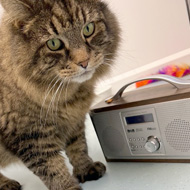Two-thirds of pets distressed during fireworks

Around 36 per cent of owners reported playing relaxing music to calm their pets during firework season.
New statistics from the RSPCA have revealed that almost two-thirds of animal owners have witnessed signs of distress in their animals during fireworks season.
Surveying pet owners across the UK, the animal welfare organisation found that 63 per cent of owners reported that their pet appeared distressed, and 69 per cent of owners had taken at least one measure to relax or prepare their pet over the firework season.
In an earlier online reporting survey during fireworks season last year, the RSPCA received more than 11,000 responses reporting fireworks negatively impacting animals, highlighting once again the scale of the issue.
The general public's views on animal welfare and fireworks were also recorded in the new survey, with 82 per cent of people surveyed agreeing that fireworks should be restricted near wildlife spots, farms and animal sanctuaries.
RSPCA campaigns manager Carrie Stones discussed the organisation's current campaigns on the matter: “The RSPCA would like to see the UK Government follow the lead of Scotland and introduce legislation to limit the sale of fireworks from 29th October to the 5th November with further restrictions to limit the days they can be let off. “While firework regulation is not devolved to Wales, it is encouraging that the Welsh Government has spoken proactively about the need to act against irresponsible firework use too.
“We would also like to see a reduction in the maximum noise level permitted in fireworks for public sale to 90dB.
“We know the public are behind us on this and that some supermarkets and councils have already taken the lead by only selling low noise fireworks and permitting displays only on certain days.”
The RSPCA has offered pet owners tips to keep animals calm during firework season, including playing relaxing music, creating a safe haven space, providing extra bedding to small animals and desensitising pets to sound.
For pets with a severe fear or fireworks, the RSPCA is advising pet owners to visit their veterinary surgeon to discuss plans and potential treatment options, including possible referral to a professional clinical behaviourist.
To read more on the RSPCA's position on fireworks, get involved with the #BangOutOfOrder campaign, or signpost pet owners to advice on keeping pets calm during the season, visit the RSPCA website.



 The Animal and Plant Health Agency (APHA) has updated its online reporting service for dead wild birds.
The Animal and Plant Health Agency (APHA) has updated its online reporting service for dead wild birds.